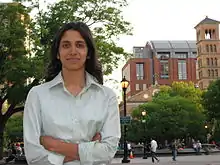Sreyashi Jhumki Basu
Sreyashi Jhumki Basu (1977–2008) was a professor of Science Education at New York University who is best known for her work to encourage urban minority students to succeed through the study of science.[1]

Background
Basu attended Stanford University, where she received a B.A. in Human Biology in 1998 and completed her doctorate in Science Education at Teachers College, Columbia University in 2006. For her PhD thesis titled How urban youth express critical agency in a 9th grade conceptual physics classroom, she received the Outstanding Dissertation Award[2] in Division K (Science Education) from the American Educational Research Association.
Later in 2006 she joined NYU's Steinhardt School of Culture, Education, and Human Development as an associate professor.[3]
Basu won the 2008 research fellowship from the Knowles Foundation for her work on the interpretation of democratic science pedagogy by new science teachers.[4]
Basu served as co-founder, acting assistant principal and science department chair at the New York City Department of Education School for Democracy and Leadership in Brooklyn, New York (2003-6).[5]
Castilleja School in Palo Alto awarded its Distinguished Alumni award to Dr. Basu in its centennial year and dedicated a garden in her memory.[6]
Basu co-authored the textbook, Democratic Science Teaching, Building the Expertise to Empower Low-Income Minority Youth in Science.[7]
Other publications of Dr. Basu include:
- Basu, S.J. (2008). Powerful learners and critical agents: The goals of five urban Caribbean youth in a conceptual physics classroom. Science Education, 92(2), 252-277.
- Basu, S.J. (2008). How students design and enact physics lessons: Five immigrant Caribbean youth and the cultivation of student voice. Journal of Research in Science Teaching, 45(8).
- Basu, S.J. (2008). Empowering communities of research and practice by conducting research for change and including participant voice in reflection on research. Cultural Studies in Science Education.
- Milne, C., Kirch, S., Basu, S.J., Leou, M. & Fraser-Abder, P. (2008). Understanding Conceptual Change: Connecting and Questioning. Cultural Studies in Science Education. (online publication Feb 2008).
- Basu, S.J., Calabrese Barton, A., Locke, D. and Clairmont, N. (Online publication, June 2008). Developing a framework for critical physics agency through case study. Cultural Studies in Science Education.
References
- Milne, Catherine; Laurie Rubel; Alberto J. Rodriguez; Christopher Emdin; Maria Rivera Maulucci; Donyagay Locke; Edna Tan; Neil Clairmont; Bhaskar Upadhyay (2009). "Celebrating Jhumki Basu's contributions to science education as a scholar and an activist: voices from the field". Cultural Studies of Science Education. 4 (2): 399–407. doi:10.1007/s11422-009-9182-9. ISSN 1871-1502.
- http://www.aera.net//uploadedFiles/Divisions/Teaching_and_Teacher_Evaluation_(K)/Newsletters/K_Summer07.pdf
- Farrell, Timothy J. (December 17, 2008). "Steinhardt Remembers Jhumki Basu, Associate Professor of Science Education". NYU Steinhardt. Retrieved 27 December 2011.
- "KSTF Research Fellows – Jhumki Basu". Knowles Science Teaching Foundation. Retrieved 27 December 2011.
- http://schools.nyc.gov/SchoolPortals/17/K533/default.htm
- "Garden dedication connects Casti with the community". Castilleja School. November 17, 2010. Retrieved 27 December 2011.
- "Democratic Science Teaching, Building the Expertise to Empower Low-Income Minority Youth in Science". SensePublishers. Retrieved 27 December 2011.